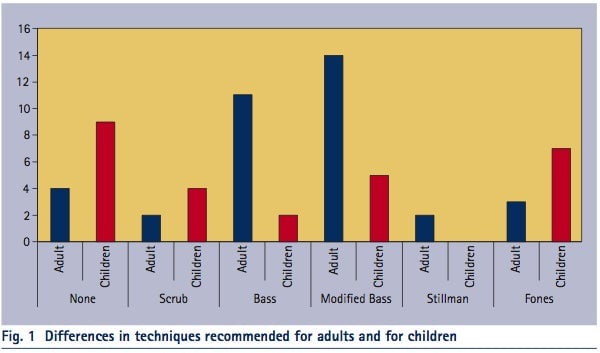Even the professionals can’t agree on the best way to brush your teeth
Does the way you brush your teeth even matter?


Does the way you brush your teeth even matter?
A study published yesterday suggests probably not.
Researchers from the University College London (UCL) looked at online recommendations given by dental associations, toothpaste and toothbrush companies, and dental textbooks on how best to brush your teeth. And while most of the 66 sources were consistent in recommending brushing twice a day, for two minutes each time, the researchers found it worrying that there was such a wide disparity in the suggested techniques.
“The public needs to have sound information on the best method to brush their teeth,” says Aubrey Sheiham, a professor of dental public health at UCL and senior author of the study, in a press release. “If people hear one thing from a dental association, another from a toothbrush company and something else from their dentist, no wonder they are confused about how to brush. In this study we found an unacceptably inconsistent array of advice from different sources.”

Why such variance? Because, essentially, nobody knows the best way to brush. “The diversity may be due to the sparseness of good research-based data on the effectiveness of a particular manual toothbrushing technique,” the authors write.
They did find more recommendations for adults to use the Modified Bass technique (the regular Bass technique trailing only slightly), which involves placing your brush at a 45° angle in the groove between the tooth and the gum line and making small circles before sweeping downward (eliminate the “sweep down” and you have the Bass), but “not very good evidence” to say why. Studies supporting the Modified Bass are few and far between, the authors note, and typically involve a small number of participants with inherent biases.
Moreover, the authors point to research suggesting the Modified Bass may not be the most effective for improving oral hygiene. And the British Department of Health notes that “no particular technique has been shown to be better than any other” (pdf, p. 21).
The professional hodgepodge of recommendations presented here, the authors say, makes it clear that the dental profession needs to come up with universally clear, evidence-based guidelines for something we’re supposed to be doing twice a day.
So what are we to do while we wait for the results? Keep it simple. “There is no evidence to suggest that complicated techniques are any better than a simple gentle scrub,” Sheiham says.